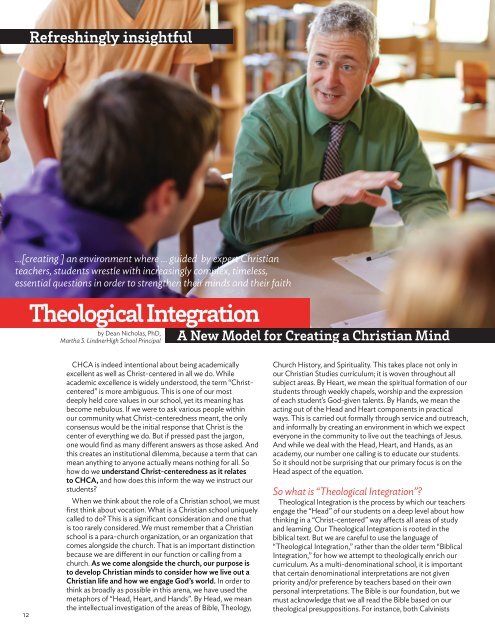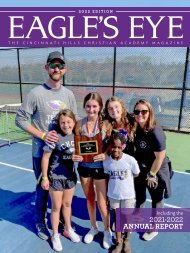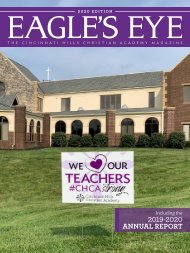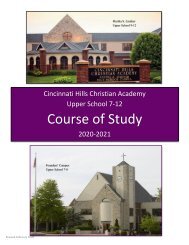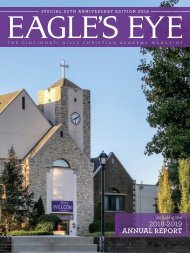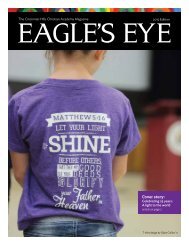CHCA Eagle's Eye 2014
Cincinnati Hills Christian Academy Eagles Eye 2014
Cincinnati Hills Christian Academy Eagles Eye 2014
Create successful ePaper yourself
Turn your PDF publications into a flip-book with our unique Google optimized e-Paper software.
Refreshingly insightful<br />
…[creating ] an environment where … guided by expert Christian<br />
teachers, students wrestle with increasingly complex, timeless,<br />
essential questions in order to strengthen their minds and their faith<br />
Theological Integration<br />
by Dean Nicholas, PhD,<br />
Martha S. LindnerHigh School Principal<br />
A New Model for Creating a Christian Mind<br />
12<br />
<strong>CHCA</strong> is indeed intentional about being academically<br />
excellent as well as Christ-centered in all we do. While<br />
academic excellence is widely understood, the term “Christcentered”<br />
is more ambiguous. This is one of our most<br />
deeply held core values in our school, yet its meaning has<br />
become nebulous. If we were to ask various people within<br />
our community what Christ-centeredness meant, the only<br />
consensus would be the initial response that Christ is the<br />
center of everything we do. But if pressed past the jargon,<br />
one would find as many different answers as those asked. And<br />
this creates an institutional dilemma, because a term that can<br />
mean anything to anyone actually means nothing for all. So<br />
how do we understand Christ-centeredness as it relates<br />
to <strong>CHCA</strong>, and how does this inform the way we instruct our<br />
students?<br />
When we think about the role of a Christian school, we must<br />
first think about vocation. What is a Christian school uniquely<br />
called to do? This is a significant consideration and one that<br />
is too rarely considered. We must remember that a Christian<br />
school is a para-church organization, or an organization that<br />
comes alongside the church. That is an important distinction<br />
because we are different in our function or calling from a<br />
church. As we come alongside the church, our purpose is<br />
to develop Christian minds to consider how we live out a<br />
Christian life and how we engage God’s world. In order to<br />
think as broadly as possible in this arena, we have used the<br />
metaphors of “Head, Heart, and Hands”. By Head, we mean<br />
the intellectual investigation of the areas of Bible, Theology,<br />
Church History, and Spirituality. This takes place not only in<br />
our Christian Studies curriculum; it is woven throughout all<br />
subject areas. By Heart, we mean the spiritual formation of our<br />
students through weekly chapels, worship and the expression<br />
of each student’s God-given talents. By Hands, we mean the<br />
acting out of the Head and Heart components in practical<br />
ways. This is carried out formally through service and outreach,<br />
and informally by creating an environment in which we expect<br />
everyone in the community to live out the teachings of Jesus.<br />
And while we deal with the Head, Heart, and Hands, as an<br />
academy, our number one calling is to educate our students.<br />
So it should not be surprising that our primary focus is on the<br />
Head aspect of the equation.<br />
So what is “Theological Integration”?<br />
Theological Integration is the process by which our teachers<br />
engage the “Head” of our students on a deep level about how<br />
thinking in a “Christ-centered” way affects all areas of study<br />
and learning. Our Theological Integration is rooted in the<br />
biblical text. But we are careful to use the language of<br />
“Theological Integration,” rather than the older term “Biblical<br />
Integration,” for how we attempt to theologically enrich our<br />
curriculum. As a multi-denominational school, it is important<br />
that certain denominational interpretations are not given<br />
priority and/or preference by teachers based on their own<br />
personal interpretations. The Bible is our foundation, but we<br />
must acknowledge that we all read the Bible based on our<br />
theological presuppositions. For instance, both Calvinists


